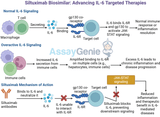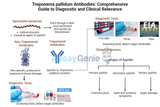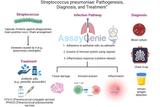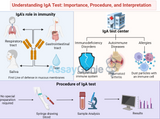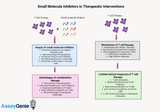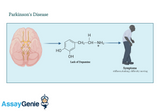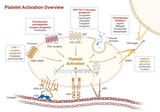Blog
Crizanlizumab: A Comprehensive Overview of Its Role in Sickle Cell Disease and Ongoing Research
Quick Facts About CrizanlizumabWhat is Crizanlizumab?Crizanlizumab is a monoclonal antibody used to treat sickle cell disease by targeting P-selectin, a protein involved in inflammation
…
7th Feb 2025
Rovalpituzumab Tesirine: Advancing Small Cell Lung Cancer Research
Quick Facts About Rovalpituzumab TesirineWhat is Rovalpituzumab Tesirine?Rovalpituzumab Tesirine (Rova-T) is an antibody-drug conjugate (ADC) designed to target DLL3, a protein overexpre
…
6th Feb 2025
Trastuzumab: Revolutionizing HER2-Positive Cancer Treatment & Research
Quick Facts About TrastuzumabWhat is Trastuzumab?Trastuzumab is a monoclonal antibody used to treat HER2-positive breast and gastric cancers. It specifically targets the HER2 protein, re
…
6th Feb 2025
Natalizumab: Mechanism, Applications, and Emerging Research in Multiple Sclerosis and Crohn's Disease
Quick Facts About NatalizumabWhat is Natalizumab?Natalizumab is a monoclonal antibody used to treat multiple sclerosis (MS) and Crohn's disease. It works by blocking immune cells from at
…
2nd Feb 2025
Denosumab: A Comprehensive Overview of Mechanism, Applications, and Research Advances
What You Need to Know About DenosumabWhat is Denosumab?Denosumab is a monoclonal antibody used primarily to treat osteoporosis and bone-related complications in cancer patients. It targe
…
2nd Feb 2025
Ivuxolimab: Redefining Cancer Immunotherapy and Research
Quick Facts About IvuxolimabWhat is ivuxolimab?Ivuxolimab is a monoclonal antibody targeting CD47, a "don't eat me" signal that cancer cells exploit to evade immune destruction.How does
…
1st Feb 2025
Ramucirumab: Mechanism, Clinical Applications, and Biosimilars in Cancer Research
Quick Facts About RamucirumabWhat is Ramucirumab?Ramucirumab is a monoclonal antibody that targets vascular endothelial growth factor receptor 2 (VEGFR-2), inhibiting angiogenesis, a pro
…
31st Jan 2025
Ponsegromab: A Breakthrough in Heart Failure and Cachexia Research
Quick Facts About PonsegromabWhat is Ponsegromab?Ponsegromab is an investigational monoclonal antibody developed by Pfizer, primarily studied for its potential in treating heart failure
…
29th Jan 2025
Ianalumab: Exploring Its Mechanism, Clinical Applications, and Research Potential
Quick Facts About IanalumabWhat is Ianalumab?Ianalumab is a monoclonal antibody currently being investigated for its potential in treating autoimmune diseases, particularly lupus and imm
…
28th Jan 2025
Belimumab: Unveiling Its Role in Lupus and Beyond
Quick Facts About BelimumabWhat is Belimumab?Belimumab is a monoclonal antibody used to treat systemic lupus erythematosus (SLE), an autoimmune disease. It is marketed under the brand na
…
28th Jan 2025
Siltuximab: Exploring IL-6 Inhibition in Castleman’s Disease and Research
Quick Facts About SiltuximabWhat is Siltuximab?Siltuximab is a monoclonal antibody targeting interleukin-6 (IL-6), a cytokine involved in inflammation and immune regulation.What is the m
…
16th Jan 2025
Treponema pallidum Antibodies: Comprehensive Guide to Diagnostic and Clinical Relevance
Treponema pallidum, the causative agent of syphilis, triggers an immune response that produces antibodies detectable by laboratory tests. Diagnosing syphilis often involves detecting thes
…
20th Nov 2024
Streptococcus pneumoniae: Pathogenesis, Diagnosis, and Treatment
Streptococcus pneumoniae, commonly known as pneumococcus, is a Gram-positive, encapsulated bacterium that is a leading cause of respiratory and invasive diseases worldwide. It is part of
…
19th Nov 2024
Horseshoe Crab Blood and Endotoxin Testing: A Comprehensive Guide
Horseshoe crabs, often referred to as "living fossils," are invaluable to modern medicine due to their unique blue blood. This blood is the source of Limulus Amebocyte Lysate (LAL), a sub
…
19th Nov 2024
Non-Small Cell Lung Carcinoma: Understanding, Diagnosing, and Treating NSCLC
Non-Small Cell Lung Carcinoma (NSCLC) is the most common type of lung cancer, representing about 85% of all lung cancer cases. NSCLC includes several subtypes, with distinct biological ch
…
14th Nov 2024
Renal Cell Carcinoma: Understanding, Diagnosing, and Treating Kidney Cancer
Renal Cell Carcinoma (RCC) is the most common form of kidney cancer, originating in the lining of the proximal renal tubules. RCC accounts for approximately 90% of all kidney cancers and
…
12th Nov 2024
Illuminating the Multifaceted Role of Acetylation: Bridging Chemistry and Biology Introduction:
Acetylation, a chemical process characterized by the addition of an acetyl functional group to a molecule, stands as a cornerstone in both biochemical and biological landscapes. Its significanc
…
16th Apr 2024
Understanding IgA Test: Importance, Procedure, and Interpretation
The IgA test, also known as immunoglobulin A test, is a diagnostic tool used to measure the levels of IgA antibodies in the blood. Immunoglobulin A (IgA) is a type of antibody that plays a cruc
…
15th Apr 2024
Biomarker Testing: Advancements, Applications, and Future Directions
Biomarkers, measurable indicators of biological processes or responses to therapeutic interventions, play a pivotal role in modern healthcare. They provide clinicians with valuable information
…
14th Apr 2024
The Rat Effectively Models Signature Cytokines of T Helper Cells
Understanding the immune system's intricacies requires models that accurately reflect its complexity. The rat, as a model organism, plays a crucial role in immunological research, particularly in
…
26th Mar 2024
Advantages of Small Molecule Inhibitors in Therapeutic Interventions
Small molecule inhibitors represent a significant advancement in the field of therapeutic interventions, offering a versatile approach to treating a myriad of diseases, including cancer, viral inf
…
13th Mar 2024
Understanding Blotchy Western Blots: Causes and Remedies
Western blotting is a powerful and widely used technique in molecular biology, essential for detecting and quantifying specific proteins in complex biological samples. However, despite its popu
…
13th Mar 2024
Decoding Parkinson's Disease: Insights into a Complex Neurological Disorder
Parkinson's disease (PD) is a progressive neurological disorder that primarily affects the motor system, leading to a wide array of symptoms ranging from tremors and stiffness to bradykinesia (slo
…
16th Feb 2024
Understanding Platelet Activation: A Comprehensive Overview
Platelet activation plays a pivotal role in hemostasis, the process that stops bleeding and initiates tissue repair after vascular injury. This complex biological mechanism involves the transforma
…
14th Feb 2024


